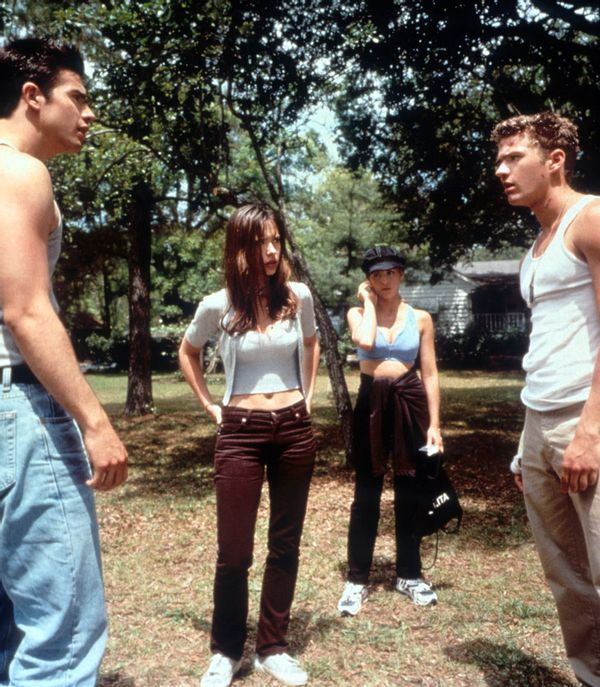
"I've already disappeared," Julie says about her trauma. "Now I want my life back."
This kind of conversation seems like it would belong in recent films, like 2018's "Halloween," where PTSD comes to Haddonfield or the horrifyingly real "Incident in a Ghostland" from the same year. But it's from 1997 teen movie "I Know What You Did Last Summer."
The foundation of that film is about as unsteady as a floating dock, but it never pretended to be otherwise. And as the film celebrates its 25th anniversary (yes, you really are that old), a rewatch reveals, along with typical sexism of the time and the camera's fixation on star Jennifer Love Hewitt's crop tops,"I Know What You Did Last Summer" is psychic, especially when it comes to a contemporary view of teen trauma.
How it started
Directed by Jim Gillespie, from a script by Kevin Williamson, the film revolves around four teens in Southport, North Carolina, a beach town with a vehicular homicide rate to rival the murder numbers of Cabot Cove, Maine, and a population of villagers who never seem to come running when there's screaming in the streets. And there is so much screaming in this movie. Driving late at night one 4th of July, Julie (Hewitt), Ray (Freddie Prinze Jr.), Helen (Sarah Michelle Gellar) and Barry (Ryan Phillippe) hit a pedestrian. With an open container of alcohol in the car, and with the judgment of teenagers, they decide to cover up the crime, tossing the body (with great difficulty) into the water and telling no one.

The characters of "I Know What You Did Last Summer" are a Who's Who of teen types. Julie is the high-achieving good girl. Ray, her smart but poor counterpart. Barry is the rich, golden boy with a temper to rival his trust fund, and Helen the blond, beauty queen destined for Hollywood.
Ahead of its time addressing trauma
"I Know What You Did Last Summer" knew: You can never go home again.
The story of "I Know What You Did Last Summer" is a little low-stakes with a mystery Jessica Fletcher would surely solve in under 50 minutes (Helen gives a nice shout-out to Angela Lansbury, at one point). But the film goes wildly rogue in its a surprisingly current view of trauma. All the teens have been impacted by the tragedy, the accident they tried so hard to forget and the memory they made a pact to push down.
Julie is doing terribly at college, so much so she has to enroll in summer school. Her hair is lank, unwashed, and she hides herself in oversized clothes. "What happened to my daughter?" her mother wonders.
Trauma happened. Trauma also ensures Helen can't handle being in New York, and heads home to work at her family's store while Ray never tried to leave or go to college at all, working as a fisherman. The ever-temperamental Barry gets much worse, snapping at the girls, his nerves frayed. Every relationship has broken up, every potential shattered by the heavy legacy of violence and repression.
Panic attacks are made flesh in 2022's "Significant Other" and 2021's achingly good "Witch Hunt." The blockbuster Showtime show "Yellowjackets" has knitted a whole series out of trauma, holding it up to the firelight and examining all its difficult facets.
But a quarter of a century before, "I Know What You Did Last Summer" knew: You can never go home again. You can never outrun (or outswim) violence. The film tried to warn us: trauma comes back. It always, always knows what was done to us. And it knows what we did.
The real-world parallels and legacy
Of course, Hewitt, who would go on to star in "Ghost Whisperer," would be the one to find the dead guy.
One cannot help also noticing the characters' lives form uncanny parallels with that of their actors. Gellar's Helen dreams of being on "Guiding Light," but Gellar got her early acting start on "All My Children," winning a Daytime Emmy Award when she was just 18. Helen and Barry are paired together in the film — but in real life, Gellar and Prinze Jr. met on set. They married young, as Helen talks about doing with Barry; her character also wants to have three children. Gellar and Prinze Jr. have two.
In the film, Julie spots the accident victim, after the teens realize they've hit something. Of course, Hewitt, who would go on to star in "Ghost Whisperer," would be the one to find the dead guy. In a great shot, the camera focuses on Hewitt's face, and not the prone figure, as she lets out an impressive scream.

Every relationship has broken up, every potential shattered by the heavy legacy of violence and repression.
The film was adapted from Lois Duncan's 1973 young adult novel. It was a loose adaptation, with some fans of Duncan, writer of such books as "Written in the Stars," feeling the big screen version was shallow compared to the novel. With a subplot involving war, the book certainly has different concerns. As Bloody Disgusting wrote, "Williamson spoke highly of Duncan's novel, but he also added, 'No one really gets killed,'" prompting him to update the story "straight into the '90s and up to code with modern horror."
"I Know What You Did Last Summer" launched a sea of other Duncan adaptations, including the well-named sequels "I Still Know What You Last Summer" and "I'll Always Know What You Did Last Summer," along with 1997's popular "Killing Mr. Griffin," 2009's outlier "Hotel for Dogs" and 2018's "Down a Dark Hall."
The first knowing summertime film also served as a harbinger for big and small screen adaptations of YA novels in general, which really hit their stride with the dawning of streaming services. In 2018, Collider lamented the lack of YA films; possibly that was premature. Just this year, Epic Reads listed over 50 adaptations. Recent hits for Netflix include "Devil in Ohio" and "Shadow and Bone" while Amazon Prime had "The Summer I Turned Pretty" and "Panic," all based off YA books.
In many ways, "I Know What You Did Last Summer" upended expectations for how and what it knew: the future, the effects of trauma and how we need these stories even in mainstream slasher fare.







